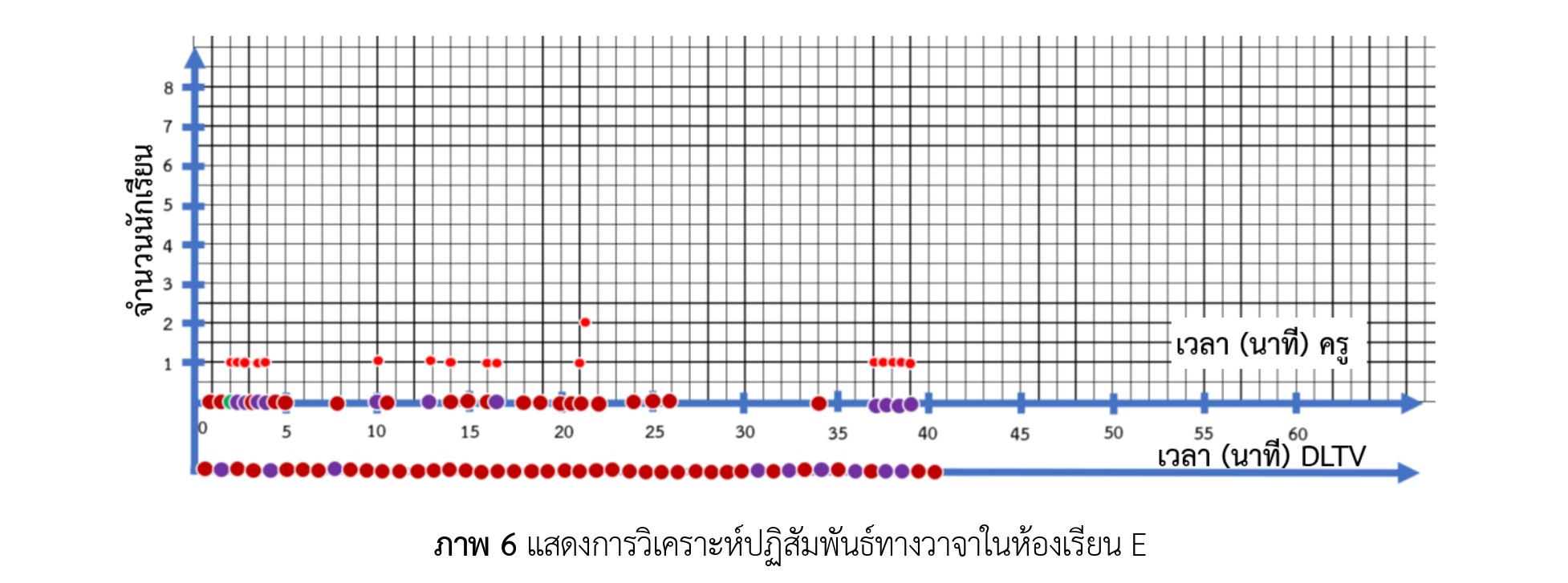The Analysis of Classroom Discourse on Distance Education via Satellite (DLTV) of the Small Size Schools under Chiang Mai Primary Educational Service Area Office 4
DOI:
https://doi.org/10.14456/psruhss.2024.10Keywords:
Classroom discourse, Distance education via satellite (DLTV), The small size schoolsAbstract
This research aimed to study teacher high-order thinking questioning and analyze classroom discourse on distance education via satellite (DLTV) in 5 classrooms of the small size schools under Chiang Mai primary educational service area office 4. The conversation in class was recorded with video cameras. The data analysis was done by classroom discourse. Questions in the classroom were classified types of high-order thinking questions. The findings revealed that teacher high-order thinking questioning averaged 26.37 percent of the total learning time. Questions in the classroom were influenced by distance education via satellite (DLTV). Most students do not participate in class discussions because class interactions begin with teacher questioning. Then, the students responded. After that, the teacher immediately checks the responses for accuracy. Teachers lack the use of questions that encourage learners to listen carefully to one another and to engage with others’ ideas.
References
ไพโรจน์ จำนงผล, พระมหาญาณวัฒน์ ฐิตวฑฺฒโน, และสมศักดิ์ บุญปู่. (2565). ศึกษาสภาพการจัดการเรียนการ สอน โดยการศึกษาทางไกลผ่านดาวเทียม (DLTV) ของนักเรียนประถมศึกษา. วารสารบวรสหการศึกษาและมนุษยสังคมศาสตร์, 3(1), 1-10.
รุ่งชัชดาพร เวหะชาติ. (2564). การจัดการศึกษาทางไกลผ่านดาวเทียม (DLTV) ยุค COVID-19. วารสารสมาคม พัฒนาวิชาชีพการบริหารการศึกษาแห่งประเทศไทย, 3(1), 29-48.
Alexander, R. J. (2017). Investigating texts about environmental degradation using critical discourse analysis and corpus linguistic techniques. In The Routledge handbook of ecolinguistics (pp. 196-210). Routledge.
Belousova, A., Mochalova, Y., & Tushnova, Y. (2022). Attitude to Distance Learning of Schoolchildren and Students: Subjective Assessments of Advantages and Disadvantages. Education Sciences, 12(1), 46. https://doi.org/10.3390/educsci12010046
Brown, J. S., Collins, A., & Duguid, P. (1989). Situated cognition and the culture of learning. Educational researcher, 18(1), 32-42.
Chen, G., Clarke, S. N., & Resnick, L. B. (2015). Classroom discourse analyzer (CDA): A discourse analytic tool for teachers. Technology, Instruction, Cognition and Learning, 10(2), 85-105.
Greeno, C. (2003). Measurement, or how do we know what we know? Topic one: Validity. Family process, 42(3), 433-435.
Howe, C., & Abedin, M. (2013). Classroom dialogue: A systematic review across four decades of research. Cambridge Journal of Education, 43(3), 325–356. https://doi.org/10.1080/0305764X.2013.786024
Howe, C., Hennessy, S., Mercer, N., Vrikki, M., & Wheatley, L. (2019). Teacher-student dialogue during classroom teaching: Does it really impact on student outcomes? Journal of the Learning Sciences, 28(4–5), 462–512. https://doi.org/10.1080/10508406.2019.1573730
Isoda, M., & Katagiri, S. (2012). Mathematical thinking: How to develop it in the classroom. World Scientific.
Mehan, H., & Cazden, C. (2015). The study of classroom discourse: Early history and current developments. In L. B. Resnick, C. Asterhan, & S. N. Clarke (Eds.), Socializing intelligence through academic talk and dialogue (pp. 13–36). American Educational Research Association.
Mercer, N., Wegerif, R., & Major, L. (Eds.). (2019). The Routledge international handbook of research on dialogic education. Routledge.
Michaels, S., & O’Connor, M. C. (2015). Conceptualizing talk moves as tools: Professional development approaches for academically productive discussion. In L. B. Resnick, C. Asterhan, & S. N. Clarke (Eds.), Socializing intelligence through talk and dialogue (pp. 347–362). American Educational Research Association.
Ng, O. L., Ni, Y., Shi, L., Chen, G., & Cui, Z. (2021). Designing and Validating a Coding Scheme for Analysis of Teacher Discourse Behaviours in Mathematics Classrooms. Journal of Education for Teaching, 47(3), 337-352.
Pimentel, D. S., & McNeill, K. L. (2013). Conducting talk in secondary science classrooms. Science Education, 97(3), 367–394. https://doi.org/10.1002/sce.21061
Resnick, L. B., Asterhan, C. S., & Clarke, S. N. (Eds.). (2015). Socializing intelligence through academic talk and dialogue. American Educational Reserach Association.
Resnick, L. B., Asterhan, C. S., Clarke, S. N., & Schantz, F. (2018). Next generation research in dialogic learning. In G. E. Hall, L. F. Quinn, & D. M. Gollnick (Eds.), The Wiley handbook of teaching and learning (pp. 323–338). John Wiley & Sons.
Resnick, L. B., Michaels, S., & O’Connor, M. C. (2010). How (well structured) talk builds the mind. In D. Preiss & R. Sternberg (Eds.), Innovations in educational psychology (pp. 163–194). Springer.
Vygotsky, L. (1978). Interaction between learning and development. Readings on the development of children, 23(3), 34-41.
Webb, N. M., Franke, M. L., Ing, M., Wong, J., Fernandez, C. H., Shin, N., & Turrou, A. C. (2014). Engaging with others’ mathematical ideas: Interrelationships among student participation, teachers’ instructional practices, and learning. International Journal of Educational Research, 63, 79–93. https://doi.org/10.1016/j.ijer.2013.02.001
Zhang, M., Lundeberg, M., & Eberhardt, J. (2011). Strategic facilitation of problem-based discussion for teacher professional development. Journal of the Learning Sciences, 20(3), 342–394. https://doi.org/10.1080/10508406.2011.553258

Downloads
Published
How to Cite
Issue
Section
License
Copyright (c) 2024 Humanities and Social Sciences Journal of Pibulsongkram Rajabhat University

This work is licensed under a Creative Commons Attribution-NonCommercial-NoDerivatives 4.0 International License.
Any articles or comments appearing in the Journal of Humanities and Social Sciences, Rajabhat Phibulsongkram University, are the intellectual property of the authors, and do not necessarily reflect the views of the editorial board. Published articles are copyrighted by the Journal of Humanities and Social Sciences, Rajabhat Phibulsongkram University.








